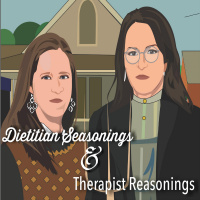Trama
Whether you are just starting out in the field of eating disorders or a seasoned, wise clinician, everyone needs support, guidance and advice once in awhile. Welcome to dietitian seasonings and therapist reasonings, hosted by therapist Meredith Riddick and dietitian Jill Sechi, eating disorders specialists supervisors with A Collaborative Approach. This podcast is intended to support, educate, and validate clinicians in the eating disorders field; emphasizing the team approach as best practice and encouraging evidence based care.
Episodi
-
Grand Finale: Encore Please!
22/12/2020 Durata: 15minDear Followers: This will be the last podcast of Dietitian Seasonings & Therapist Reasonings......we have served our community for two years and are ready to close this chapter of our work in the eating disorder community. We hope this podcast was helpful in your journey in understanding eating disorders through the encouragement and process of supervision concepts (vs just education). You can still find us! Through A Collaborative Approach we will continue to offer dual sessions to clients that desire to have both a dietitian and therapist in session: www.acollaborativeapproach.com. Meredith Riddick is continuing to provide supervision and webinars (with even continuing education credits by 2021) at www.harmonytherapygroup.com Jill Sechi is continuing to provide supervision as well as offering a residency program at www.wcandnt.com or www.jsechinutritiontherapy.com
-
Tummy Troubles
01/12/2020 Durata: 19minJill and Meredith review basics about digestive issues that one often sees when working with clients that are struggling with an eating disorder. There are some great podcasts that cover more in depth- stomach issues- which often clients want to focus on food to change or eliminate. Do you have clients with "IBS" or "constipation, diarrhea, or vomiting" or perhaps struggle with sleep? Today Jill and Meredith discuss how these digestive issues might come up in session and are more often than not due to handling emotions in effectively (ie, not actually dealing with them but attempting to numb or distract from emotions one feels challenging). Meredith encourages looking at the client as a "whole" person and not just seeing their issues as "all in their head." Jill discusses the nutritional issues that impact digestive issues. Often digestive issues (up to 40% of IBS cases) are due to the "mishandling" of emotions through eating disorder behaviors and or malnutrition through elimination of foods, food groups
-
Good 'Jill' Hunting
25/11/2020 Durata: 39minWe're back! Yes, right before Thanksgiving Day to boot! Today Jill and Meredith discuss countertransference. This information is from Lisa Ferentze. Check out her resources at the Ferentze Institute . Have you ever seen a movie or TV show that had a therapist role. Were they ethical? Would YOU do this in session? Lisa Ferentze discusses Wilson and Lindy's models of countertransference. Listen on as Meredith and Jill will highlight a few areas from this training. What is countertransference? How can it be helpful and perhaps hurtful in sessions. KNOW YOURSELF and use SUPERVISION to process your countertransference when it comes up! Watch this clip from Good Will Hunting for a little background or go watch the movie. We will cover these aspects of countertransference: 1-Empathic disequilibrium: Feel a little ineffective with clients? 2-Empathic withdrawl: Feeling distant from your client for your own safety? 3-Empathic enmeshment: Feeling highly related to a client's story leading to inappropriate boundaries
-
Macros 101: Understanding carbs, protein and fat
16/11/2020 Durata: 25minJill takes the stage this week to discuss the importance of understanding macronutrients. The current "diet" trend is for clients to be "counting macronutrients." What are macronutrients? What do you mean by "counting them?" Jill discusses the very basics of macronutrients. What they are and how they are described in nutrition and dietetics. She also goes through basic functions of macronutrients. Here are a few links/resources for your clients: Having difficulty getting your client to see a specialized dietitian (ED RD): https://www.jsechinutritiontherapy.com/post/why-is-it-important-to-see-a-dietitian-that-specializes-in-eating-disorders
-
[REPOST] Season 2, Episode 6: A Wrinkle In Time
09/11/2020 Durata: 36minYep, we are a bit behind on recording but have several new episodes coming up! We decided to repost this important episode. Enjoy! Be tuned in to next Monday for a new episode.
-
All in a WORD
26/10/2020 Durata: 21minMeredith and Jill discuss the words one uses in conversation with clients and also in conversations between colleagues and professionally. What words are we talking about? For example saying "completed suicide" vs "committed suicide." Calories vs energy? How about "obesity" which is often referred to as the "O" word within the ED community. Listen on as Meredith and Jill discuss the WORDs we use and how they can hold deep meaning. Do you want to be "right" or do you want to be "effective?" Know your audience and work on strong skills of communication and persuasion.
-
Crowd Sourcing, Anyone?
19/10/2020 Durata: 10minJill goes on a rant and Meredith goes in more detail about the importance of not crowd sourcing to get support with clients on social media. There are many issues about posting detailed information to seek consultation on difficult cases on social media platforms! What's available instead? Paid consultation with a supervisor (who you get to determine level of of experience and expertise). We encourage you to form a peer consultation group within your community of ED professionals. There are also many resources on iaedp that provide monthly supervision (have to be a member): peer consultation group and also one for a focused BIPOC perspective. Another resource more specifically for dietitians is EDRDPRO. And of course there are supervisors (like Meredith and Jill) and others that provide paid consultation groups throughout the United States.
-
When to refer to higher level of care
12/10/2020 Durata: 19minMeredith and Jill review higher level of care recommendations presented by the American Psychiatric Association guidelines. There are basically 5 levels of care ranging from out patient to inpatient. The chart helps reflect on key points to consider. As always, seek supervision or peer consultation when you need more support with the client or understanding the complexities of helping a client with this decision.
-
[REPOST] Season 1, Episode 21: Compassion vs Colluding
05/10/2020 Durata: 23minWe are reposting a past season episode as we are preparing for several new episodes coming down the pike! Meredith and Jill discuss the challenge of treating clients with eating disorders. How do you hold support and understanding yet also provide accountability during the eating disorder recovery process? If you have not heard this episode, listen on or listen again as we discuss how to not align with the eating disorder which may bring about difficult discussions and uncomfortableness in the room.
-
Understanding Metabolism
28/09/2020 Durata: 37minJill takes the wheel this week with the focus of metabolism and how eating disorders effect the metabolism process of the body. Jill goes through very basic concepts of metabolism, function and how eating disorders can lower or "rev up" the body's metabolism (during refeeding). Is metabolism as simple as "calories in vs calories out?" Mmmmm, no. Listen on! As you listen to this episode, Jill hopes you understand the importance of using a dietitian. If you struggle getting a client to see a specialized dietitian, this article may help. Dr. Guadiani also has some great articles on metabolism to share with clients or understand more details about our amazing machine: the human body.
-
Death of a Client
21/09/2020 Durata: 15minThis is a bit of a somber episode. Meredith and Jill discuss their personal experiences losing a client or a client in their practice. How do you handle this as a clinician? As Meredith states "we build relationships with clients and we genuinely care about them." It makes sense they we will be affected by their passing or that may be worried that they might pass away. Here are some resources that might be supportive to you if you have experienced the death of a client. Article Coping with a Clients Suicide
-
"Dear ED Self"
14/09/2020 Durata: 22minJill begins this episode with a client's letter to her ED. A letter of "goodbye." How do you know when to discharge a client or decrease frequency of appointments. Do you use your gut feeling? What behaviors are you hoping to see? Often in the ED field, clients are seen for a longer length of time. Now this may be more known from a therapist point of view. In particular to a dietitian, a dietitian may see a client for several years which is different for the "traditional" nutrition field. Listen on as Meredith and Jill discuss timelines, what to look for and why some clients need support longer than others before it's time for discharge. Haven't heard of Julie Dillon's podcast, Love, Food? Click here to enjoy those episodes!
-
[REPOST] Season 1, Episode 4: Body Image, Diving Deep!
08/09/2020 Durata: 39minWe've decided to repost and episode from season 1 on body image. Meredith and Jill discuss body image when working with clients, their own body image, and what the treatment provider roles are and how to address them.
-
Part 2: Trauma and EDs. 'The Burger Keeps the Score.'
31/08/2020 Durata: 33minThis is the second part of our series on Trauma and EDs. Meredith reviews the concept of fight, flight or freeze and gives descriptions of various characteristics of these behaviors. Meredith emphasizes the importance of diagnosing accurately as there are may characteristics of trauma that seem to be other psychiatric diagnosis. For example some clinicians feel that Borderline Personality Disorder is actually the "result" of complex trauma. Also, there are many behaviors that result in eating disorder behaviors as well. Our title is based off a very good book that we recommend you read: The Body Keeps the Score: Brain, Mind and Body In the Healing of Trauma by Bessel Van der Kolk, MD. Please note that this podcast episode does not replace the importance of more indepth understanding and training often required to effectively treat clients with trauma.
-
Part 1: Trauma and EDs. 'The Burger Keeps the Score.'
24/08/2020 Durata: 28minThis session (and maybe the next) will be some Meredith time! She reviews basic aspects of trauma. What is trauma? How does this occur? When we say someone has trauma, what does this mean? Meredith also discusses various interventions therapists may use. Our title is based off a very good book that we recommend you read: The Body Keeps the Score: Brain, Mind and Body In the Healing of Trauma by Bessel Van der Kolk, MD. Please note this podcast episode does not replace the importance of more indepth understanding and training if this is an area you are interested in supporting clients through.
-
[REPOST] Season 1, Episode 20: "Supper"vision: What is it and what it's not.
17/08/2020 Durata: 20minWe are working on some new episodes so please tune in next week! Remember to sign up for our newsletter to receive some extra bonus materials such as role plays. As we are busy behind the scenes, listen to one of our previous episodes where we talk about the importance of obtaining supervision. Meredith and Jill discuss the supervision process for the certified eating disorders specialist designation (CEDS or CEDRD). Meredith describes supervision for the therapist which is required for one to obtain a LPC or LCSW. Jill discusses how the supervision process is new and unfamiliar for a dietitian as they are not required to go through supervision to obtain their RD status. Jill and Meredith discuss the general current requirements to obtain the certified eating disorders specialist designation (as of Fall 2019 through iaedp). We would love to support you in this process. Interested in supervision? Visit our website at www.acollaborativeapproach.com/supervision
-
[REQUEST] Running On Empty
10/08/2020 Durata: 29minWe are so excited to get requests for topics! Today's podcast is covering compulsive exercise in relationship to eating disorder recovery. Meredith and Jill first review the difference between athletes and compulsive "exercisers." An excellent resource is Dr. Kate Bennett's website: Athlete Insight. Meredith reviews aspects of exercise that a therapist and dietitians in the field of eating disorders can focus on in the assessment process. Athletes, compulsive exercise and "over" exercise aspects are reviewed. Think INTENT and MOTIVATION. Other resources: Dr. Brian Cook Guidelines for the Use of Exercise in Eating Disorders Treatment
-
Including Parents and Caregivers in Eating Disorders Treatment with Becky Henry
03/08/2020 Durata: 53minWelcome Becky Henry to this weeks podcast. Read more about Becky Henry here. Becky discusses a bit of her own story about how she was first a parent of a child in the throws of an eating disorder. She discusses what was helpful for her as she was supporting her child in the recovery process. Becky also discusses the perspective of the parent and the process she went through in order to effectively support her child. Becky currently has a successful parent coaching program and reviews some of the process she uses to support current parents that are going through similar situations. Parents and caregivers are a vital part of the treatment team. How do we get them on board when often the parent is overwhelmed or not understanding the treatment process? Other resource: Recovery Roadmap Specialists
-
[REQUEST] Food, Trauma and Stay'n in Yo Lane
27/07/2020 Durata: 12minThis is an episode addressing a requested topic: "How to handle clients whose trauma involves a lot of foods (either specific types of foods or certain settings or preparing foods) as an RD (ie how to do your work while staying in your lane?)" Meredith and Jill discuss their thoughts and opinions on how to address when clients struggle with trauma specific to food concerns (such as abuse, food insecurity, etc). Meredith discusses grounded skills and validation that can be helpful that dietitians absolutely need to know and can support a client with in session. Also dietitians often have not been taught how to "handle emotions." Jill discussed the importance of holding space and learning the skills of validation. Interested in supervision? Visit our website and sign up for our monthly newsletter! Follow us on our socials: Facebook and IG: @acollaborativeapproach
-
Supporting Budding Adults and Their Parents
20/07/2020 Durata: 22minMeredith and Jill discuss the difficulties that can occur when working with clients that are 18 or older and their usually very concerned parents. There are of course laws and guidelines with age however with eating disorders, malnutrition can affect an individual's brain. Working with the most "nourished" brain in the room is often needed (the parent). Listen on as they explore what might be helpful in sessions, what Meredith and Jill often do in their sessions working with this transitional group of clients. Interested in supervision? Visit our website. Follow us on social media: we are on Facebook and IG ! @acollaborativeapproach Links for Becky Henry and Beth Ayn


![[REPOST] Season 2, Episode 6: A Wrinkle In Time](http://media3.ubook.com/catalog/book-cover-image/675441/200x200/6FF1B062-C152-43C1-C8ED-7F746868AC9D.jpg)
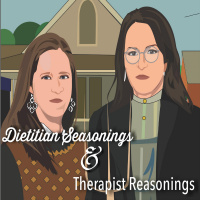
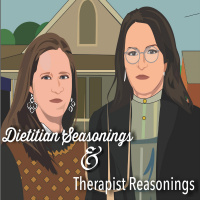
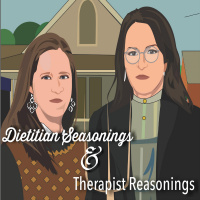
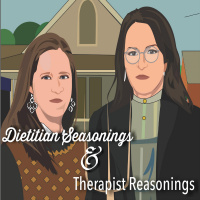
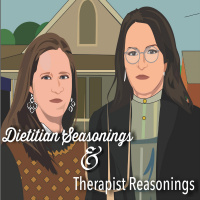
![[REPOST] Season 1, Episode 20: Suppervision: What is it and what its not.](http://media3.ubook.com/catalog/book-cover-image/675441/200x200/02D51018-961E-DE91-340A-555B93D088E5.jpg)
![[REQUEST] Running On Empty](http://media3.ubook.com/catalog/book-cover-image/675441/200x200/CE5EEF16-3D4E-DC29-1468-275D0DCDD53B.jpg)
